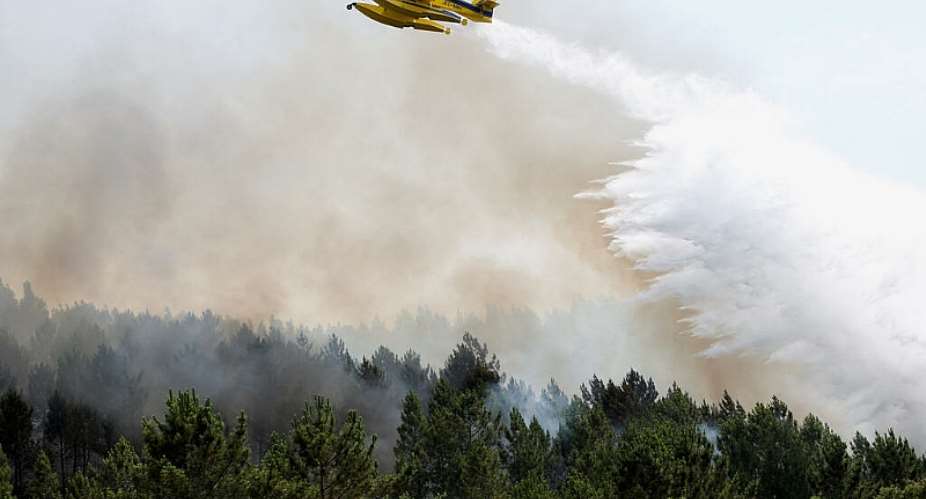Wildfires are burning twice as much global tree cover as they were 20 years ago according to new data, with climate change a major culprit in the acceleration of fires.
"This record-breaking loss was due in part to prolonged heatwaves that would have been practically impossible without human-induced climate change," a study by Global Forest Watch and the World Resources Institute research group found.
More than three million hectares are burnt each year, an area the size of Belgium.
Boreal forest losses
The largest losses are in the boreal, or taiga, forests – mainly coniferous forests located in Russia, Canada, and Alaska, which have some of the largest carbon stores on earth.
Some 70 percent of losses over the past 20 years occur in boreal regions. Scientists estimate that these high-altitude forested areas are disappearing faster because they are warming faster than the rest of the planet.
Russia lost 5.4 million hectares of tree cover in 2021 alone due to forest fires. That was an increase of more than 30 percent from the previous year.
This fits in with the global data, as 2021 was one of the worst years for forest fires. Some 9.3 million hectares were lost that year.
- In pictures: France ravaged by summer of wildfire and drough
- After months of wildfires, France told to brace for floods
Additionally, the European Union satellite monitoring service said last week that the region has suffered under record fire activity, especially in forests lost in France, Spain and Portugal.
The vast majority – some 70 percent – of fire-related tree cover loss over the last two decades occurred in boreal regions, likely because high-latitude regions are warming at a faster rate than the rest of the planet.
"In these boreal regions carbon has accumulated in the soil over hundreds of years and has been protected by a moist layer on top," said James McCarthy, research analyst at Global Forest Watch, adding that the constant fires are exposing the carbon in the soil.
These changes to forest structure and soil chemistry can have a negative effect, according to the report, indicating that boreal forests could turn from a carbon sink into a source for carbon emissions.
Climate change
Climate change is likely a “major driver” according to scientists, with drier conditions leading to higher emissions from fires, creating a "fire-climate feedback loop".
In tropical areas, fire-related tree loss has increased by five percent, but it is not the main cause of loss; deforestation and forest degradation are the main drivers.
However, deforestation accelerates the possibility of trees being lost to fire in the future, as less trees mean higher regional temperatures and drier vegetation.
The researchers called on government globally to better maintain forests, stopping controlled burning, which can get out of control very quickly, and to end deforestation.
"Forests are one of the best defences we have against climate change," said McCarthy.





 E-Cedi will be used as a weapon to fight money laundering and corruption — Bawum...
E-Cedi will be used as a weapon to fight money laundering and corruption — Bawum...
 Election 20204: Transfer power to us peacefully for your own good — NDC tells NP...
Election 20204: Transfer power to us peacefully for your own good — NDC tells NP...
 Voter registration: Don't bus minors to registration centres — Nana Akomea warn ...
Voter registration: Don't bus minors to registration centres — Nana Akomea warn ...
 Error in registration slip: Trust the Commission on its mandate — EC assure Ghan...
Error in registration slip: Trust the Commission on its mandate — EC assure Ghan...
 Ejisu by-election: NPP aspirant who projected less than 5% votes for Aduomi cong...
Ejisu by-election: NPP aspirant who projected less than 5% votes for Aduomi cong...
 Election 2024: Stolen BVR kits could be used to illegally register people – NDC ...
Election 2024: Stolen BVR kits could be used to illegally register people – NDC ...
 60% of SHSs taken off double track system – Dr Yaw Osei Adutwum
60% of SHSs taken off double track system – Dr Yaw Osei Adutwum
 Voter registration: We hope to hit over one million registered voters in Volta -...
Voter registration: We hope to hit over one million registered voters in Volta -...
 Akufo-Addo not obliged to disclose full KPMG audit report – Presidency
Akufo-Addo not obliged to disclose full KPMG audit report – Presidency
 ECG staff used ransomware to sabotage paperless system, can you imagine they eve...
ECG staff used ransomware to sabotage paperless system, can you imagine they eve...
